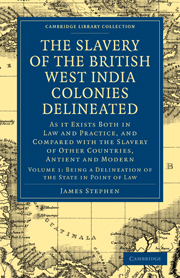 The Slavery of the British West India Colonies Delineated
The Slavery of the British West India Colonies Delineated Book contents
- Frontmatter
- PREFACE
- Contents
- PRELIMINARY CHAPTER: Of the Necessity and Importance of describing the State in question, and the general Plan of the Work
- BOOK I OF THE SLAVERY OF OUR COLONIES CONSIDERED AS A LEGAL INSTITUTION
- Appendix, No. 1
- Appendix, No. II
- Appendix, No. III
- Appendix, No. IV
- Appendix, No. V
- Frontmatter
- PREFACE
- Contents
- PRELIMINARY CHAPTER: Of the Necessity and Importance of describing the State in question, and the general Plan of the Work
- BOOK I OF THE SLAVERY OF OUR COLONIES CONSIDERED AS A LEGAL INSTITUTION
- Appendix, No. 1
- Appendix, No. II
- Appendix, No. III
- Appendix, No. IV
- Appendix, No. V
Summary
Perpetual separation and exile from a man's native land, and all the endeared objects of his early attachments and habits, is justly considered by lawgivers as the severest punishment that human laws can inflict, death only excepted; and therefore they have generally reserved it for offences of the class properly called capital, when perpetrated under some extenuatory circumstances, or when, though the safety of society demands an expulsion from it of the guilty member, it may be allowable mercifully to spare his life.
Now if the innocent negro, born or long settled in one island, and transported by his master's authority to labour till his death in another, does not undergo all the sufferings of the English convict sent for life to Botany Bay as a commutation for the pains of death, it must be because he has less sensibility than the hardened felon whose painful fate he shares. This, it will be admitted, is not probable; because capital crimes are rarely committed till after a long course of vicious and disgraceful conduct, by which the offender has forfeited the regard of all his decent relatives, and lost the sense of every tender and virtuous attachment; so that in being cast out by his country, he is separated from nothing that he loves; except perhaps the immediate means of indulging his depraved and sensual appetites. The poor transported slaves, on the contrary, might invoke the testimony of their oppressors, in proof that their unfortunate race, the females especially, are remarkable for strength of attachment to their offspring, their parents, and other relatives and friends; and yet from such of these as remain behind, their removal to another island is a separation as final and hopeless as death itself could make.
- Type
- Chapter
- Information
- The Slavery of the British West India Colonies DelineatedAs it Exists Both in Law and Practice, and Compared with the Slavery of Other Countries, Antient and Modern, pp. 452 - 474Publisher: Cambridge University PressPrint publication year: 2010First published in: 1824


